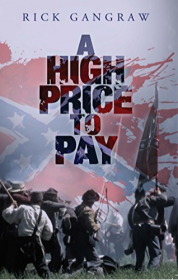A High Price to Pay
By Rick Gangraw
When Rensey joins the Confederate Army
 When Rensey joins the Confederate Army with a group of teenagers from his hometown, he s absolutely certain he’s doing the right thing. After all, he’s heroically protecting his state from Northern invaders. But Rensey and his friends quickly discover that war is not the glorious adventure of their boyhood dreams. Rather, it becomes a nightmare of terror as he is forced to kill or be killed.
When Rensey joins the Confederate Army with a group of teenagers from his hometown, he s absolutely certain he’s doing the right thing. After all, he’s heroically protecting his state from Northern invaders. But Rensey and his friends quickly discover that war is not the glorious adventure of their boyhood dreams. Rather, it becomes a nightmare of terror as he is forced to kill or be killed.
Through countless battles and determined bravery, Rensey becomes a hero in the eyes of his fellow soldiers, but … deep inside Rensey can’t help but wonder … am I doing the right thing? But as the months of war turn to years, the battle-hardened boys begin to wonder if they’ll even survive.
Rensey yearns for the day when he can be back home for good and start a family of his own. At one point, this young man, a heroic soldier only a few months earlier, considers desertion from the army. He is constantly trying to see God’s hand in the war, but while his world is crashing around him, he struggles with his faith. It is not until he returns home that he able to see how God used the war to bring about a great change to the country, even through years of tremendous chaos, and it is at that point where he finally has peace of mind about the events of the past few years.
family of his own. At one point, this young man, a heroic soldier only a few months earlier, considers desertion from the army. He is constantly trying to see God’s hand in the war, but while his world is crashing around him, he struggles with his faith. It is not until he returns home that he able to see how God used the war to bring about a great change to the country, even through years of tremendous chaos, and it is at that point where he finally has peace of mind about the events of the past few years.
EXCERPT
Chapter 1
“It is a house like no other house, nestled in the beautiful mountains of North Carolina. Many decades ago, the Cherokee were the only people that hunted on this land between Salem and Asheville, but for the past few generations, it’s been the home of the Goode family. Our family. The original immigrant ancestor of this family, my grandfather’s grandfather, came to America and built this house. The family home would be a reflection of his faith in God. He designed it in the shape of a cross, so rather than being one large rectangle, it is made up of crossed rectangles. He was so thankful for the freedoms he had in this new country and did not want anyone in his family to forget it.”
Samuel Goode, known by almost everyone as ‘Grandpa,’ lifted his hand up, catching the eyes of each child sitting at his feet. They stared and listened to every word he spoke, following his hand to find out what he would do as he slowly moved it over their heads.
“A bird flying overhead could look down and see a special symbol with a roof on it. My great-great-grandfather called the house ‘Christ’s Cross’ and we still call it that today in 1861.”
The old man paused to gaze at the children gathered around him. Smiling at the hungry eyes that awaited his next words, he winked at his grandson, Rensey, standing across the room. Grandpa kept them occupied while the adults prepared the meal for this day, and several of the adults stood close enough to hear him speak. This family had grown up with these stories, and it seemed as though they never tired of hearing them.
Light streamed through the large windows, illuminating the family and its surroundings. Children sat on the floor, older boys and girls stood in the doorways by paneled walls, and adults gathered nearby between the kitchen and sitting room, all listening intently in this rustic old room. Samuel sat in his rocking chair near a great stone fireplace, one of many in this house.
With its heavy log mantle, it was usually the center of attention in this room, lined with hardwood floors and handmade furniture. On this day, Grandpa remained the main attraction.
The family didn’t have a tremendous amount of money, but they had a wealth beyond imagination in farming abilities, wood-working skills, a strong work ethic, and love. This celebration was for Samuel Goode’s 76th birthday. Some of these family members had traveled three days by wagon over the mountains to spend time with their cousins, aunts, uncles, and grandparents. Today provided a cherished opportunity to be with this man as he relived these stories again for everyone in the family. His thick Southern accent was always enjoyable to listen to, and he made good use of it when he retold their family history.
“My father believed so strongly in having the freedom to live in this land, he joined the War for Independence against his family’s former country. He fought against the British in several battles south of here when they invaded our neighbors’ farms. Surviving the conflict, he went on to marry my mother, and I came into this world soon after the British surrendered. If you walk out to the land near the end of the clearing, you’ll see the graves of my parents, my father’s parents, and on back to the people who started this family here in North Carolina. They’re all buried there. Someday I’ll join them, and my bones will stay forever on this beautiful land.”
Rensey, his brother Dudley, and their cousins from out of town, listened from across the room.
War for Independence against his family’s former country. He fought against the British in several battles south of here when they invaded our neighbors’ farms. Surviving the conflict, he went on to marry my mother, and I came into this world soon after the British surrendered. If you walk out to the land near the end of the clearing, you’ll see the graves of my parents, my father’s parents, and on back to the people who started this family here in North Carolina. They’re all buried there. Someday I’ll join them, and my bones will stay forever on this beautiful land.”
Rensey, his brother Dudley, and their cousins from out of town, listened from across the room.
Dudley looked around at the boys. “Well, I’ve already heard Grandpa tell this a few times, and I already know how it ends. Let’s go outside.”
The four boys were within a year or two from each other, yet they stood about the same height. Each had similar dark brown hair and might have passed as four brothers. They slipped out and walked along the side of the house. Rensey had been eager to talk about the current political situation, with several of the Southern states planning secession from the Union.
“What we’re seeing now compares to the time when our great-grandfather made a choice to fight for freedom against this family’s former country. It seems so similar, with the Northern states trying to force their laws on the South, the same way England forced their laws on the American Colonies almost a hundred years ago.”
The other boys nodded, while Dudley said, “You think too much,” and everyone laughed, even his brother. “All of that reading you do has affected your brain.”
Rensey continued, “Our great state has every right to stand up against the leaders of this country, to be independent from an oppressive nation. I’m confident its citizens would be willing to fight for their freedom just as the Colonists did. Just like our great-grandfather did.”
“You sound like a politician,” said one of his cousins with a laugh.
“Well, Pa says I would make a good senator someday.”
The boys discussed this further and ended up walking by the family burial grounds. The graves covered an area near a vista that overlooked acres of Goode land that reached out for miles.
“Everyone considers old Moses Goode to be a hero since he fought for his country’s freedom in the War for Independence,” Rensey added. “I want to do the same now. I’m seventeen, almost old enough to fight, and I’m willing to do so to protect the rights of my state and my family.”
The other boys agreed, making their commitments to join the army if that time ever came.
“What about Dudley?” asked one cousin. “He’s only sixteen and too young to join the army.”
“All we’d have to do is say I’m eighteen, and it’ll be just fine,” replied Dudley, sounding like a high-pitched version of his grandpa.
His cousin agreed. “You’d have to lie about his age in order to help him get in.”
Rensey didn’t like the sound of that but made no objection.
A prouder group of boys didn’t exist in North Carolina at that moment as they stared at the different gravestones, specifically the distinctive stone that marked their great-grandfather’s grave. Overshadowing them was a tall white gravestone with writing that glorified his part in the War for Independence, the largest stone in the cemetery. Certainly a hero’s monument in the eyes of these boys, and Rensey was determined to be like him.
Dudley broke the silence. “I’m sorry to interrupt this special moment, but I have to leave for something far more important.”
He then quickly started down the hill to the outhouse as the other boys walked back toward the house. The family home had a path from the back door that led to a grapevine planted by the boys’ grandfather. The vine covered the path under a structure he had built to allow people to walk under it and pick grapes as they strolled away from the house. It meandered around to where several tables had been set up for the family meal. The outhouse was only a few steps off this trail. A crowd of people soon came out of the house, following this walkway to start setting up the food on the tables.
Dudley entered the outhouse and locked the door before the people walked nearby. Rensey picked a couple of grapes from the vine, then ran quietly back up to the outhouse and grabbed a stick that he had placed there earlier. He popped the grapes into his mouth as a few more people walked from the house to the backyard where everyone started gathering to eat. Rensey inconspicuously used the stick to reach up and inside to unlock the outhouse door, swinging it open. Dudley sat there with a surprised expression on his face. The door stayed open, out of Dudley’s reach, and his cousins, aunts, and uncles walked by and waved at him, laughing at his predicament.
Rensey sped away behind the barn to join his cousins as they merged into the line to get the food. Meanwhile, Dudley could do nothing but smile weakly and wave back at everyone as they passed by. The boys’ father, Lawrence Goode, walked carefully down the steps with his cane. Years ago, a horse fell over with him on it, crushing his knee and causing him to require assistance whenever he walked. Noticing a commotion underway near the outhouse, he turned his head to see what had happened. Lawrence glared at Dudley sitting helplessly with the open door. He headed in that direction of his son and started to close the door.
“Dudley, it’s more appropriate to take care of business with the door shut,” his father said, trying to avoid eye contact. Dudley nodded his head in agreement before disappearing from view.
“Yes, sir,” echoed Dudley’s voice from within the outhouse.
As their father walked toward the tables, Rensey and his cousins tried to control their hysterical laughter. He overheard his father say to his mother, “I do believe Rensey may have had something to do with the outhouse door,” and his mother shook her head without a smile.
Within a couple of minutes, Dudley burst from the outhouse, running straight for Rensey. The boys stood near the food table but scattered like frightened birds as Dudley ran toward them. The angry boy sped by his family with a determined look on his face.
Lawrence eventually met up with his son, Rensey, before the meal began, and he stood beside him for a few minutes staring at the blue skies and sunshine. They were on a hill behind the house that overlooked the Goode property, and the warm air breathed across the tall grass in the pasture below, leaving patterns that appeared to be alive as the grass moved in the breeze. Clouds rushed by, slowly changing shapes as the wind gave them new life.
Lawrence said sternly, “Some things are just wrong, regardless of how much fun they appear to be.” He paused, giving Rensey a moment to contemplate what he had said. “I am a bit disappointed with you for putting your brother in such an embarrassing position.”
Rensey almost burst out in laughter at the vision he had in his mind, but he wisely kept it under control. He turned to look into his father’s eyes. A seriousness filled the man’s expression.
Lawrence sighed. “I expected you to be more mature than that, especially when another person’s dignity was involved.”
Rensey looked away as his heart sank. Staring across the field, he observed the patterns caused by the wind rushing over the tall grass. “You’re right, Pa. It was childish to do it in front of our family from out of town. Please accept my apologies.”
Locking eyes with his father for several seconds, Rensey wondered about his punishment. His pa was right. He deserved the worst for what he had put Dudley through on a family gathering. To his relief, Pa set his hand on Rensey’s shoulder and smiled as they both walked closer toward their family. Sometimes his pa taught a lesson with only a few well-chosen words, without having to scold his sons, and this proved to be one of those times. Rensey had learned his lesson; his punishment being that his father expressed disappointment in his immature actions. That would be enough.
Within no time, everyone sat down in his or her seats and the boys laughed as best of friends again. Rensey’s two little sisters, Rachel and Rebecca, ages thirteen and eleven, sat with their girl cousins, while the boy cousins sat together. There was no talk of war. Everyone seemed to have a pleasant time together in the sunshine and warm breezes. This was indeed a Heaven on Earth. Who in their right mind would not fight to preserve this peace and freedom? Their grandfather slowly stood up and a hushed silence fell over the crowd as he gave the blessing.
“Amen,” said everyone when he finished, and they all began to eat.








